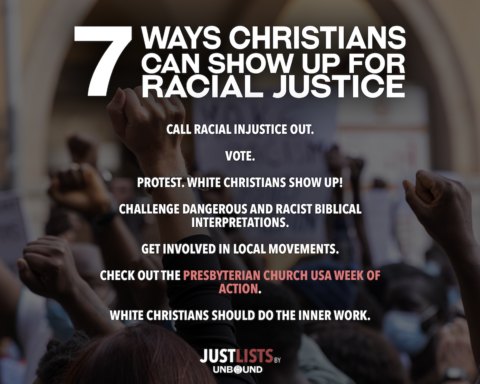
When I was small, my grandfather used to tell me that the shortest verse in the Bible is “Jesus wept.” It made a strong impression on me, perhaps because it was the only verse I can remember him quoting. It was powerful to think of Jesus, the Son of God, crying together with his friends in the face of death. The Gospel of Luke tells us that Jesus also wept for the entire city of Jerusalem: “If only you knew the things that make for peace!” Jesus was picturing what would happen to that beautiful city in the years to come, when not a stone would be left upon another.
Self Development of People (SDOP), a ministry within the Compassion, Peace, and Justice area of the PC(USA), was created in response to the harrowing years of the ‘60s, where the lack of the ‘things that make for peace’ was made most visible in the riots and burning of many American cities: Los Angeles, Detroit, Newark, New York, Baltimore, Birmingham, Chicago, Rochester, Cleveland, Philadelphia, Omaha, and Washington, D.C., among others.
Confronted with the evidence marshaled by people such as civil rights leader James Foreman, Presbyterians came to recognize that our church had been complicit in the structures that forced many Americans to live lives of outward submission and intense poverty. In response, these people of faith developed a ministry through which our members could partner with grassroots community groups who sought justice for themselves and their communities.
___________________________________________
SDOP is founded upon the basic presupposition that people are capable of solving their own problems one step at a time if given access to basic resources.
___________________________________________
SDOP recognizes that human dignity, creativity, intelligence, and gumption are spread across the human race. The people best suited for “development work” in a particular community are the very people who make up that community, for they understand best their own deepest needs and the potential avenues for addressing those needs. SDOP is founded upon the basic presupposition that people are capable of solving their own problems one step at a time if given access to basic resources.

“Self-help” is a popular term these days. There is a greater appreciation for the need to listen to the people who are “being helped” in planning almost any type of program. In spite of this, it is still unusual for a grant to be given directly to the people who will benefit from the program. This is exactly how SDOP works – and works well, at that! The reason this method is so effective is that the beneficiaries are also the people who design, implement, and evaluate the program/project. It is truly from the people, by the people, and for the people who have had the opportunity to name and address their own needs.
One of the benefits of city-life is how many resources are within close proximity: colleges and universities, transportation, diverse art and music, business expertise, government. Urban-dwellers have access to communication through radio, public television, and the press that can be brought to bear on the issues confronting the community. These resources allow groups to build coalitions that can better effect change.
___________________________________________
Presbyterians came to recognize that our church had been complicit in the structures that forced many Americans to live lives of outward submission and intense poverty.
___________________________________________
The 45 years since SDOP was established have seen many changes. Crime and violence in many major cities has been greatly reduced. However, many of the issues that led to rioting in the ‘60s still exist, and some have worsened. The numbers of people incarcerated and released continues to rise. Globalization has created a stark contrast between economic ‘winners’ and ‘losers’ and has intensified great waves of migration. The numbers of undocumented immigrants who are at the mercy of employers and neighbors has grown substantially. Trafficking of individuals, a new form of slavery, is greater today than it was at the height of the slave trade. Income inequality has increased steadily over the past 30 years, and recent levels of unemployment and poverty have been devastating. The need for community groups to come together to address these issues is as great now as it ever has been.

In the face of this reality, the National SDOP Committee works through four regional task forces, as well as one international task force. Each domestic task force chooses a particular city where we believe our work can be most beneficial. Our partnerships are not limited to these cities and we partner with many rural groups as well, but we make a special effort to visit and understand the issues and opportunities found in Los Angeles, Detroit, New Orleans and Baltimore.
The work SDOP’s partners are doing in these locations can be described as nothing less than the very presence of God in the midst of the city. For example, the Baltimore Algebra Project is a chapter of a national network that works to improve public schools in struggling neighborhoods. The Baltimore chapter is unique because it is run by young people from the neighborhoods themselves. These young people tutor students in selected public schools while they themselves learn about leadership and community organizing. A few years ago, the leaders of the Baltimore Algebra Project stopped a Youth Detention Center from being built in their part of the city. They are currently engaged in educating students, parents, and the broader community about the imminent closing of a local high school. The group sees an opportunity to restore local control of the school.
___________________________________________
People who live in poor neighborhoods often have decisions made for and about them – without their input and with no effective way to make their voices heard.
___________________________________________
No Boundaries, also in Baltimore, is a local non-profit whose members recognize that one of the issues holding Central West Baltimore back is the distrust between neighborhoods. They are actively addressing this issue through public events that intentionally cross these boundaries, like block parties and public art projects. In Chicago, high school and college men growing up in under-resourced and violence-prone neighborhoods have organized themselves into a group called Peace Together – a group of creative artists and musicians who have used their gifts to promote peace and launch a t-shirt business. These groups are part of a growing movement that seeks local solutions to community problems.

Detroit is facing so many challenges today that some people have simply given up; but not the members of the Oakland Avenue Community Garden and Greenhouse Cooperative! Along with growing food to provide fresh produce for their neighborhood and income for themselves, they have made community outreach a priority. Working with the Michigan State Extension, they brought a nutrition class to their community that helped them lose weight and commit to exercising. They have brought sculpture into their community garden through an alliance with the Yountville School and Greening of Detroit. Over 1,000 people attended the dedication ceremony for this sculpture, an event that included music from the Cass High School Marching Band and performances by the Mosaic Youth Theatre.
Some thoughtful, visionary homeless people in Clearwater, Florida, with cooperation from members of Peace Memorial Presbyterian Church, dreamed of starting a thrift store that could provide them with an income while at the same time meeting the needs of their neighbors. This group developed a plan and received a grant to cover rent, utilities, insurance, and a host of other initial expenses. The individuals working in the thrift store have gained immeasurable experience in work and business ownership, from merchandizing, purchasing, and payroll to store operation, customer service, and tax regulations. Some of the original members have moved on to other employment, but the store continues to operate, providing income and experience for co-op members and much-needed inexpensive goods for hundreds of working poor.
___________________________________________
Self Development of People continues to partner with economically challenged community groups who seek the “things that make for peace” and justice in their own locations.
___________________________________________

People who live in poor neighborhoods often have decisions made for and about them – without their input and with no effective way to make their voices heard. SDOP seeks to counter this reality, and several of our partners have done so in powerful ways. Just last December in Oakland, CA, residents found themselves facing utility cutoffs when Pacific Gas and Electric sought to override the cancellation protections for elderly and disabled persons. By organizing and appearing at the Utilities Commission, the Service Worker Project for Affordable Utilities has prevented cancellation for 181 members. All together, since the SDOP grant was received, members of this project have stopped the cancellation for 406 people.
Self Development of People continues to partner with economically challenged community groups who seek the “things that make for peace” and justice in their own locations. Sometimes we weep along with them, as we did when we visited the still-devastated sections of New Orleans in January. Mostly, however, we are buoyed up by the people who face their challenges with wisdom, tenacity, and the hope born of working together. We are proud to be able to partner with them. We are thankful to our churches for making this work possible. We are blessed to be a part of this ministry.
*****
AUTHOR BIO: Rev. Dr. Cathryn (Cathy) Surgenor is the principal evaluator for Evaluation Builds Understanding, (www.keyquestion.net), a consulting firm that works with churches and non-profits as they improve their programs through focused feedback. She has been a member of the SDOP National Committee since 2010 and currently serves on the Northeast and International Task Forces .Before joining the National Committee, she chaired the SDOP Committee of Hudson River Presbytery, where she has been a Teaching Elder since 1998. Cathy is married to Peter Surgenor, and together they enjoy 5 daughters and 5 grandchildren.
To read other articles from Week 3: God in the Midst of the City, click here.
Read more articles in this series.





Unbound Social